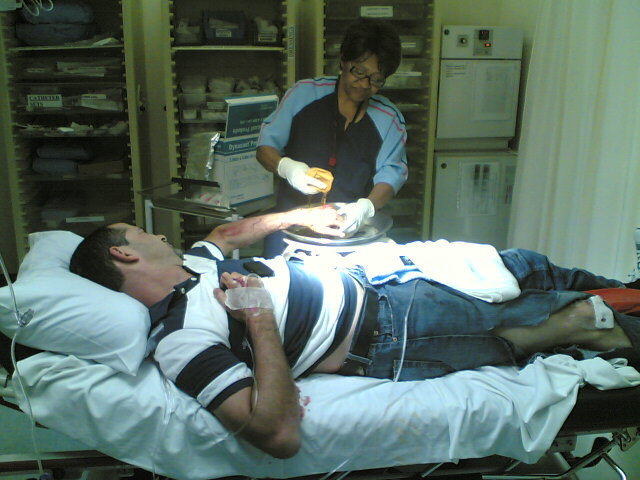photo by CC user dplanet on Flickr
Suffering an injury in a foreign country can be devastating. If you’ve really looked forward to your vacation, trained hard for your sports event or banked on getting a lot done on your business trip, an injury can really set you back. Worse, though, is when a simple injury has much more severe consequences than it would at home, simply because you don’t know how to deal with the local medical system or can’t get the help you need. You can do something about this situation.
Minor injuries
It’s always a good idea to take basic first aid supplies with you when traveling so that you can patch up small injuries without needing help. If you’re using sporting facilities or are visiting a busy resort, you will often find that there are trained first aiders nearby who can help and who will either speak English or be good at communicating without it, by letting you show them what is wrong. Nonetheless, it’s a good idea to carry a phrase book that includes some basic medical terms, and if you have any chronic health issues – from hypermobility to asthma – make sure you know the local words for them. Importantly, you should never let a strain or sprain go unattended simply because communication is difficult or you don’t want to interrupt your trip. Such injuries can get much worse and lead to long-term problems if left untreated.
Severe injuries
Wherever you travel, it’s always important to know how to call an ambulance or whatever other type of emergency help is available, just in case. Almost every country will provide you with emergency treatment without requiring money upfront, though you should be aware that there might not be the same kind of facilities available that you might expect at home.
If you suffer a severe leg injury or spinal damage, special travel arrangements may be needed in order for you to get safely home. You’ll need to talk to your airline to work out what they can offer you. If you have travel insurance, it should cover all or most of any additional costs.
Risk of infection
Whenever you travel, you’re exposed to infectious agents that you won’t have encountered at home; you won’t have any immunity to them and they could make you very ill. This is partly why it’s important to get the recommended vaccinations before you travel, but even those won’t protect you from everything, so you need to be extra careful about any damage to your skin. If a cut or abrasion is exposed to untreated water, you should get it checked out by a doctor. The same goes for any wound – however small – where the surrounding skin reddens and feels warm, and any injury after which you develop a fever.
Managing your medicines
If you are given painkillers or other medicines to help you following an accident, you should be aware that they might not be licensed for use back home or in other countries that you plan to travel to before returning. If the prescribing doctor is unable to give you advice on this, try to contact your own doctor back home to work out the best course of action. Always try to get your prescriptions filled in a hospital pharmacy as in some countries you cannot rely on other pharmacies stocking reliable drugs.
Who can you turn to?
Depending on your travel arrangements, your hotel or tour director may be able to provide you with help in the event of an accident. If you are on an activity holiday or you have signed up to engage in a properly managed sport – anything from climbing to kayaking – the people supervising this should take responsibility for your care. If you’re in a situation where you find you cannot get any kind of useful assistance, contact the embassy for help. They can arrange things such as translation and emergency financial assistance.
Claiming compensation
No matter how well you handle the situation, getting injured abroad can leave you with extra bills to pay. It can deprive you of a great experience that you’d been really looking forward to. It can also, in the worst-case scenario, leave you with lasting medical problems. Accidents happen, but if yours was caused by somebody else’s negligence, or if you did not receive the help you should have, you should consider making a compensation claim. This is easy to do and it could help you get your life back on track or even afford another vacation to make up for the one that was spoiled.
Suffering an injury is always distressing but if you have a good idea of what to do when it happens, it will be far less disruptive. If you’re lucky, getting the right help will mean you can continue to enjoy your trip.
